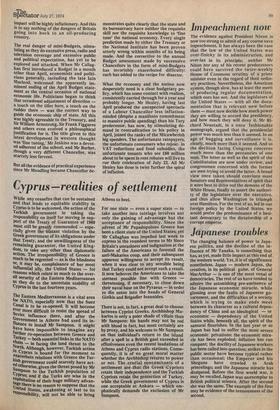Hey, big spen,der!
Of course Mr Carr was right to accuse the Chancellor of presenting in his mini-Budget a bag of small goodies designed to make the Government popular enough to face an early general election: that was predicted long before Mr Healey got to his feet. But there is more to an assessment of last Monday's financial statement than a partisan response to a partisan action. 4.4. The real difficulty is that Mr Healey's correction 44:11 a course determined last April increases the difficulties faced by the British economy far more than it reduces them. More: the illusions 41vhich have bedevilled recent Chancellors have /now now clearly taken full hold of Mr Healey.
The two most important figures in Mr Healey's fifteen-minute mini-Budget address were his prediction that the general effect of his actions would be the creation of 20,000 extra jobs by the end of 1975, and his argument that the cancellation of the Maplin project represented a reduction in public expenditure of £17 million. As regards the first figure it need only be said that no Chancellor and no set of Treasury advisers have successfully predicted for a decade or more the relationship between economic stimulus and employment figures. Furthermore, there is no indication whatever — given any sensible approach to the real meaning of unemployment statistics — that such figures are now, or are likely to be under present economic conditions, remotely, socially or in any other way, disruptive.
In regard to the proposed Maplin saving, it is now sadly clear that the Chancellor and his advisers have, like Mr Barber and his, failed to distinguish between real, continuing expenditure and theoretically committed expenditure. As Mr Heath correctly observed, towards the end of his period of power, the immediate cancellation of both Maplin and the Channel Tunnel would save very little, for the sums which were and are involved are tiny. The great objective of the defeat of inflation can only be served by early action taken towards balancing the budget. As it is, Mr Healey, for all that he has produced the occasional welcome stimulus, like the relaxation of dividend control, has presented a package that will cost in real terms rather more than 000 million in a full year. Even though that sum will almost be met by a £500 million loan from Iran — well did Tones cry in the House on Monday that we were exchanging the gnomes of Zurich for the gnomes of Tehran — the fact that that loan is at commercial and market rates will ensure that its immediate impact will be highly inflationary. And this is to say nothing of the dangers of Britain going into hock to an oil-producing country.
The real danger of mini-Budgets, stimulating as they do excessive press, radio and television coverage and excessive public and political expectation, has yet to be explored and attacked. When Mr Callaghan first introduced a Budget in a month other than April, economists and politicians generally, including the late lain Macleod, welcomed the apparently imminent ending of the April Budget statement as the central occasion of national economic life. Politicians began to think that occasional adjustment of direction — a touch on the tiller here, a touch on the rudder there — was the correct way to guide the economic ship of state. All this was highly agreeable to the Treasury, and Sir William Armstrong, Sir Frank Figgures and others even evolved a philosophical Justification for it. The title given to this latest development in western thought was 'fine tuning.' Mr Jenkins was a devoted adherent of the school, and Mr Barber, though a very different Chancellor, was scarcely less fervent.
But all the evidence of practical experience since Mr Maudling became Chancellor de monstrates quite clearly that the state and its bureaucracy have neither the requisite skill nor the requisite knowledge to 'fine tune' the national economy. Every single prediction made by either the Treasury or the National Institute has been proven utterly wrong within months of its being made. And the corrective to the annual Budget assessment made by successive Chancellors in the form of mini-Budgets has invariably exacerbated difficulty: each has added to the recipe for disaster.
What the economy and the nation now desperately need is a clear budgetary policy, which has some contact with realism, consistently carried through for a year and probably longer. Mr Healey, having last April produced the unexpected spectacle of a Labour Chancellor less inflationminded (despite a manifesto commitment to massive public spending) than his Tory predecessor, has now, by stimulating demand in contradication to his policy in April, joined the ranks of the Micawberish big spenders. The unfortunate ratepayers, the unfortunate consumers who rejoict in VAT reductions and food subsidies, the unfortunate tenants who see £60 million about to be spent in rent rebates will live to rue their celebration of July 22. All Mr Healey has done is twist further the spiral of inflation.




























